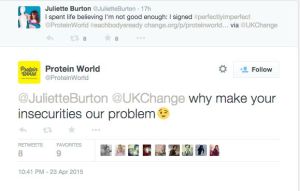Via your classmate Mathuri, this campaign from Protein World, a UK-based brand of supplements, has caused an uproar.
Promising a beach-ready body enraged consumers who resented the skinny standard to which they are perpetually held. Rather than back down from backlash, Protein World ramped-up.

Protein World either made and authentic stand about its core values, or lost thousands of potential consumers. Time for you to weigh in (HA!)

After a quick perusal of their website and Twitter feeds, it seems that this is pretty consistent with their overall image. With hashtags like #LBDCHALLENGE, #BEACHBUMCHALLENGE, a popular product line called The Slender Blend, and Slender Sundays, it’s very obvious what kind of body image Protein World stands for. Therefore, it’s hardly a surprise that Protein World would come up with a campaign like this. The “lost potential customers” would never have become customers in the first place, since they could likely find something similarly offensive within a few minutes on Protein World’s website or Twitter feed, even without the Beach Body campaign.
That being said, they would do with better management of how they post responses on Twitter. The Twitter responses were pointed and antagonistic.
[note: it eventually devolves into offensive language]
TLDR:
– Campaign is consistent with brand
– Protein World could use better social media management
On another note, here’s an interesting link about the different standards of women’s beauty over time
http://www.boredpanda.com/women-ideal-body-type-history-video/
I’m not from the UK but learned about this ad and some of the, IMO, poor judgment in tweets like the above. My favorite response was from Zusterschap in this article about this “beach body” topic http://bycatstello.co.uk/why-i-stripped-to-make-a-statement-plus-whats-next/
What is Protein World’s brand if not to fat shame as your communications and behavior affect how your brand is seen. In doing so, even if their supplements are used to maintain a healthier body – that’s not what a “beach body” is. I think they missed the mark when targeting “beach bodies” vs. healthier bodies.
Not to get into a body shaming discussion here, as I know there will always be polar opinions on this topic, I think the company would have been served to be more supportive/open minded to the negative comments vs. going on the attack which you can see in the replies. A good brand listens to feedback and how it’s being seen as that’s its true positioning. I wouldn’t be surprised if the brand is harmed by this, but I’m not in the UK I don’t know what the public’s feedback can do – in the US I suspect things might have been handled differently.
Overall to me sadden state when brands have to make us feel bad about ourselves to promote their benefits. That’s my takeaway from this.
It seems like Protein World has hosted many similar programs before this one. The Little Black Dress Challenge perpetuates the same issues surrounding body image in that they are promoting weight loss in order to fit into a skimpy item of clothing, instead of focusing on a healthy body (http://www.proteinworld.com/lbdchallenge). The program encourages users to use Protein World’s nutrition plans and exercise regimens.
The current campaign might resonate more with current customers, rather than new customers. Protein World’s current customers might see this as encouragement to consume more weight loss or protein products in order to meet this goal. The brand feelings that are created by this advertisement could be considered “sexy” which seems to be consistent with other aspects of their advertising.
However, new or potential customers could feel alienated, and these customers could generate the opposite feelings. They might consider the brand superficial or insincere, which could deter new customers from connecting with the brand.
I wish that Protein World at least gave half of the consideration that Katie did in how it could be viewed. It was a poor marketing/headline choice. I’m hopeful it will not be successful, however the more we speak about it, I fear they’ll feel that they were successful.
When I first read about Protein World’s blunder a few weeks, I immediately shook my head. As someone who is heavily involved in fitness, it’s common to see fitness supplement brands to have campaigns similar to Protein World’s, but with one major difference. These other brands focus on health instead of fitting into a certain size of clothing. By doing so, they reduce the risk of alienating any potential new customers as it does not shame them for not being certain size.
The backlash wouldn’t have been so bad for Protein World if they had use better social management, as mentioned in previous comments. Their responses to critics were extremely defensive and bordering on rude. They should have used that opportunity to make the conversation about health and mitigate the criticism.
I just saw another article about this issue today. These ad’s are now popping up in the U.S as well and are again receiving the same backlash as in the U.K. http://www.buzzfeed.com/katherinenevitt/banned-uk-ads-asking-are-you-beach-body-ready-are-now-in-nyc?bftw&utm_term=4ldqpfp#.loRgKvapQ
In the article you can see that people in the U.K had very strong negative reactions to this campaign and responded back with embracing all body types and basically shutting down the ad.
The head of global marketing at Protein World Richard Staveley said that having theses ad’s in the U.S. is “a big middle finger to everybody who bothered to sign that stupid petition in the U.K.” Reading this I was very shocked that someone who represents a brand that already has a bad name in the industry would ever think this was a smart thing to say. The brand is just digging themselves into a bigger hole and consumers in the U.S. are responding very similarly to those in the U.K. Can the brand do anything to fix their image at thing point, or is the damage already done.